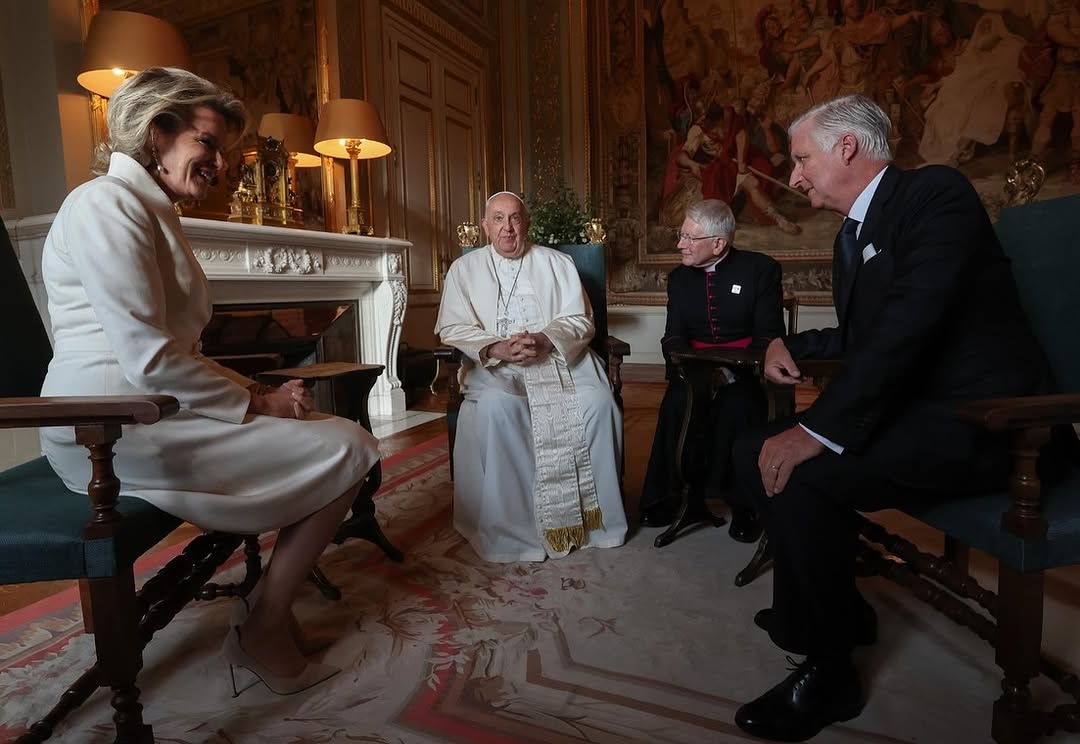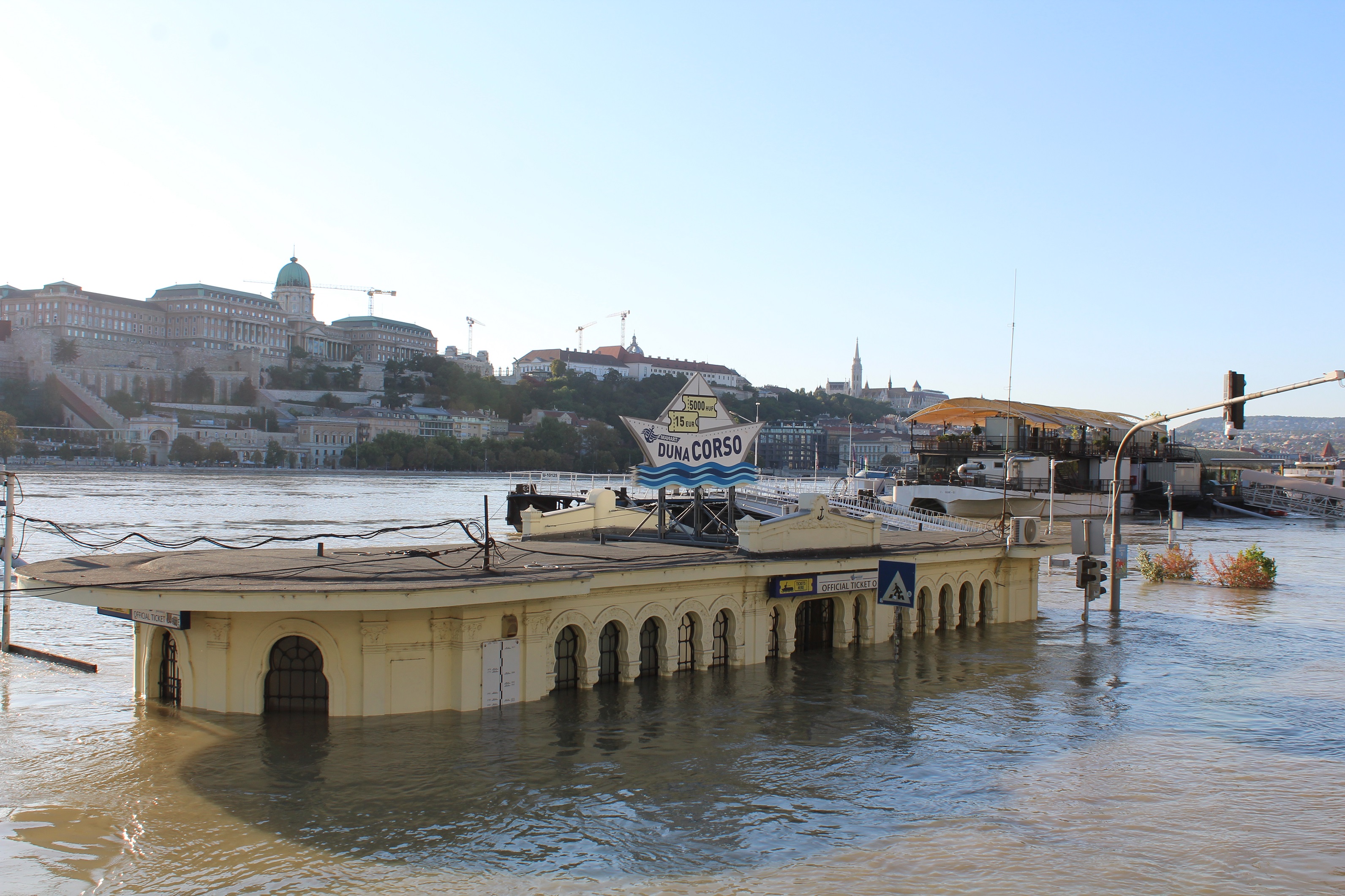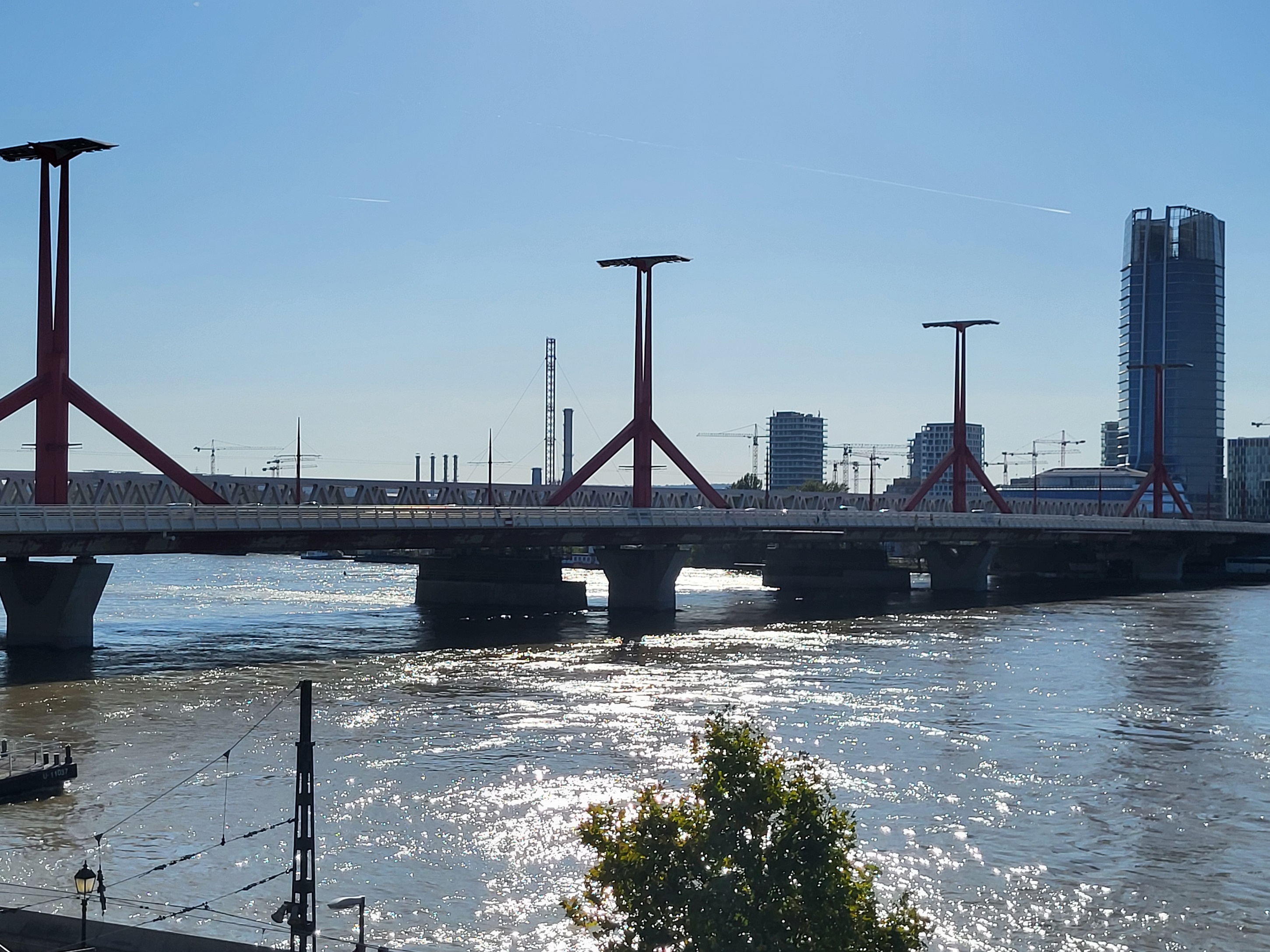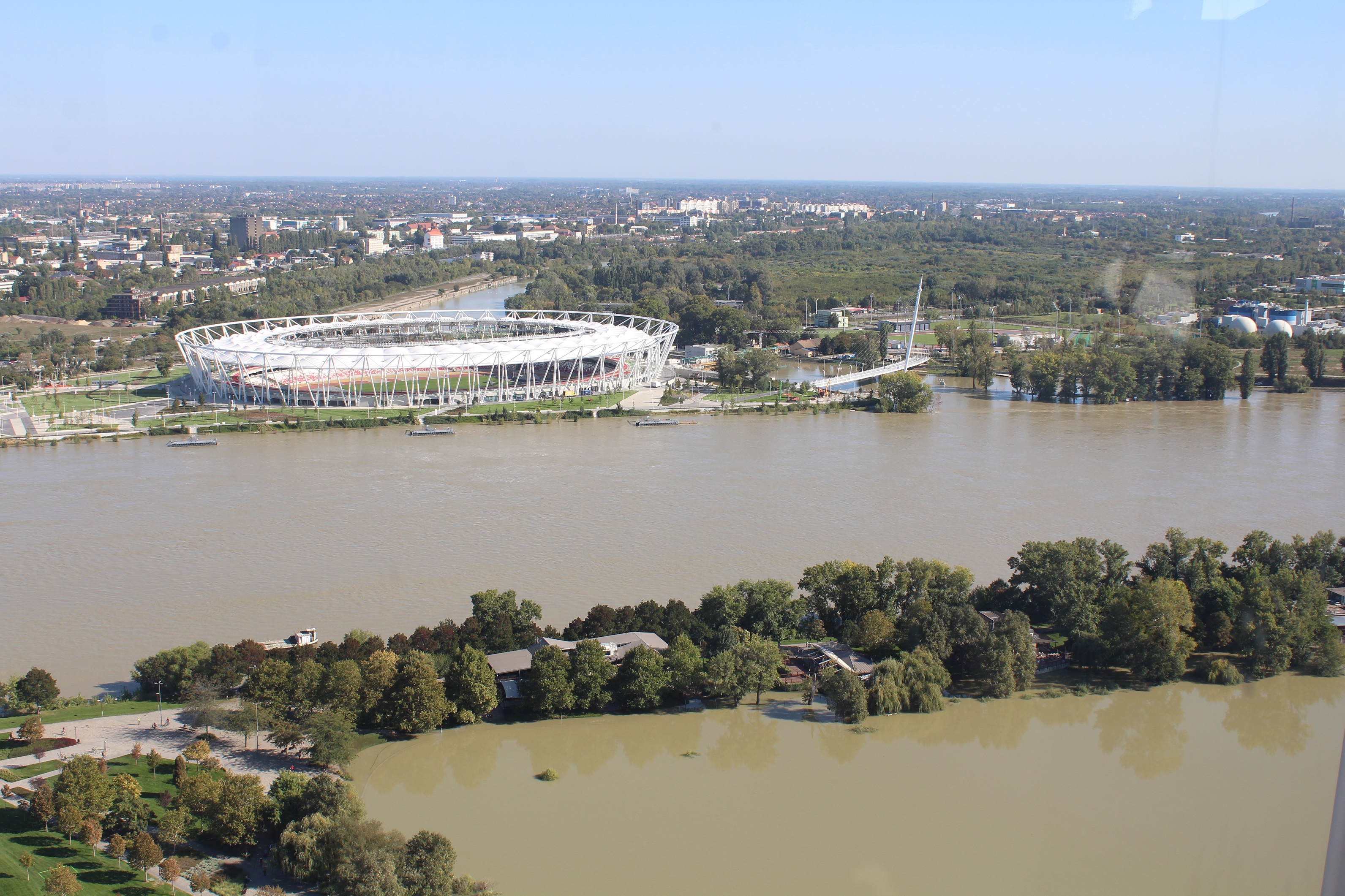.
European Parliament
Wednesday, 9 October 2024 09:09:49 - 09:36:43 Plenary Session. Presentation of the programme of activities of the Hungarian Presidency. Current speaker Viktor Orbán, Hungary. /video/ (Source: euparl.europa.eu)
- Note: The interpretation in English - Duration: 00:26:54 –
Európai Parlament
Szerda, 2024 október 9. 09:09:49 - 09:36:43. Plenáris ülés. A Magyar Elnökség tevékenységi programjának bemutatása. Orbán Viktor, a Tanács soros elnöke: – Tisztelt Elnök Asszony! Azért jöttem, hogy ébresztőt fújjak. Draghi és Macron elnök úr példáját követem. Az Európai Uniónak változtatnia kell, és én erről szeretném Önöket ma meggyőzni. Magyarország 2011 után másodszor tölti be az Európai Unió Tanácsának soros elnökségét. Én személyesen is másodszor látom el ezt a feladatot. Álltam már itt Önök előtt. Másodszor mutatom be Önöknek a magyar elnökség programját. 34 éve vagyok parlamenti képviselő, ezért tudom, hogy megtiszteltetés, hogy Önök most meghallgatnak engem. Miniszterelnökként beszélni a parlamenti képviselők előtt mindig megtiszteltetés. Van összehasonlítási alapom, 2011-ben, az első elnökségünk idején is válságokkal küzdöttünk. Kezelnünk kellett akkor a pénzügyi válság következményeit, az arab tavasz következményeit és a fukusima-i katasztrófát. Akkor erősebb Európát ígértünk, és teljesítettük is, amit vállaltunk. Elfogadtuk az első európai szintű roma-stratégiát és a Duna-stratégiát is. A mi elnökségünk alatt indítottuk el az Európai Szemeszter nevű gazdaságpolitikai koordinációs folyamatot, ami akkor még valóban az volt, aminek hívták, és az első elnökségünk alatt fordult elő utoljára, hogy az Unió sikeresen lezárt egy csatlakozási folyamatot, Horvátország csatlakozását. Emlékeztetőül: mindez 2011 ben történt. Nem volt könnyű, de a munkánk ma sokkal nehezebb, mint akkor volt. Nehezebb, mert az Unió helyzete ma jóval súlyosabb, mint 2011-ben, és talán súlyosabb, mint az Unió története során bármikor. Mit látunk ma? Ukrajnában, vagyis Európában háború dúl, súlyos konfliktusok pusztítanak és hatnak ki ránk a Közel-Keleten és Afrikában, és mindegyik konfliktus magában hordozza az eszkaláció veszélyét. A migrációs válság 2015 óta nem látott méreteket ölt. Az illegális migráció és a biztonsági fenyegetések most már azzal fenyegetnek, hogy a schengeni térség szétesik. És mindeközben Európa veszít globális képességéből. Draghi szerint Európát lassú agónia fenyegeti. S idézhetem Macron elnök urat is, aki szerint Európa meghalhat, mert 2-3 éven belül kiszorul a piacairól. Tisztelt Képviselők! Látható, hogy az Unió a saját sorsát meghatározó döntések előtt áll. Mélyen tisztelt Elnök Asszony! Az elnökség természetesen szervezési és koordinációs munka is. Ügyintézés. Jelentem a tisztelt képviselőtársaknak, hogy eddig 585 tanácsi munkacsoporti ülést vezettünk le, 24 nagyköveti tanácskozást elnököltünk, megtartottunk 8 formális és 12 informális tanácsülést, 69 elnökségi rendezvényt bonyolítottunk Brüsszelben, 92 rendezvényt pedig Magyarországon. A magyarországi rendezvényeinken több mint 10 ezer vendéget köszönthettünk. Tájékoztatom Önöket, hogy a Tanácsi jogalkotási munka teljes gőzzel zajlik, 52 jogalkotási dosszién dolgozunk a Tanács különböző szintjein. Az elnökség kész bármikor megkezdeni a trilógus tárgyalásokat is az Európai Parlamenttel. Jelenleg mindössze két jogalkotási dossziéban folytatunk triológust Önökkel, de van még 41 dosszié, amiben erre szükség lenne, és várjuk, hogy ez megtörténhessen. Tudom, hogy választások voltak, és ilyenkor nehéz intézményi átmenetnek vagyunk tanúi. De most már eltelt négy hónap, és mi készen állunk arra, hogy a 41 konzultációra váró dossziéban is együttműködhessünk Önökkel. A magyar elnökség tisztességes közvetítőként és konstruktív együttműködésre törekszik valamennyi tagállammal és intézménnyel. Ugyanakkor a magyar elnökség meg fogja védeni a Tanács szerződéseken alapuló jogosítványait, például az Európai Parlament és a Bizottság közötti intézményközi megállapodás tekintetében is. De tisztelt Képviselők, mélyen tisztelt Elnök Asszony! Az elnökség nem csupán ügyintézés. A magyar elnökségnek politikai felelőssége is van. Azért jöttem most ide Önökhöz Strasbourgba, hogy bemutassam, mit javasol a magyar elnökség Európának ebben a válságos időszakban. A legfontosabb, hogy a mi Uniónknak változnia kell. A magyar elnökség a változás hangja és annak katalizátora kíván lenni. A döntéseket az Unió tagállamainak és intézményeinek kell meghozniuk, nem a magyar elnökségnek. A magyar elnökség problémákat vet fel és javaslatokat tesz az Unió békéje, biztonsága és jóléte érdekében. Első helyre soroljuk a versenyképesség problémáját. Szinte mindenben osztom Letta és Draghi elnök urak jelentéseinek helyzetértékelését. Röviden: az EU gazdasági növekedése az elmúlt két évtizedben tartósan lassabb volt, mint az Egyesült Államoké és Kínáé. Az uniós termelékenység lassabban növekszik, mint a versenytársaké. A világkereskedelmi részesedésünk csökken. Az Unió vállalatai kétszer-háromszor magasabb villamosenergia-árakkal szembesülnek, mint az Egyesült Államokban. A földgázárak itt négyszer-ötször magasabbak. Az orosz energiáról való leválás következtében az Európai Unió jelentős GDP-növekedést veszített el, és közben jelentős pénzügyi forrásokat kellett átcsoportosítani energiatámogatásokra, s a cseppfolyósított földgáz behozatalához szükséges infrastruktúra megépítésére. Az európai vállalatok fele az energiaköltséget tekinti a beruházások fő akadályának. Az energiát intenzíven használó iparágak esetében, melyek fontosak az Unió gazdaságában, a termelés 10-15%-kal esett vissza. Mélyen tisztelt Elnök Asszony! A magyar elnökség azt javasolja, hogy ne ringassuk magunkat abban az illúzióban, hogy a zöld átmenet önmagában megoldást kínál erre a problémára. Ez nincs így. Még ha teljesülnek is a megújuló energiaforrások telepítésére vonatkozó célkitűzések, tehát még ha teljesülnek is a céljaink – induljunk ki ebből, legyünk pozitívak – minden elemzés szerint 2030-ig nem csökken jelentősen azoknak az üzemóráknak, óráknak az aránya, amelyben a fosszilis tüzelőanyagok határozzák majd meg az energiaárakat. Ezzel szembe kell néznünk. Az európai zöld megállapodás alapja az volt, hogy új zöld munkahelyeket hozunk létre. Azonban a kezdeményezés értelme megkérdőjeleződik, ha a dekarbonizáció az európai termelés visszaeséséhez és munkahelyek elvesztéséhez vezet. Az autóipar az Uniós tervezés hiányának egyik legkirívóbb példája, ahol iparpolitika nélkül alkalmazzuk a klímapolitikát. Úgy alkalmazzuk a klímapolitikát, hogy közben nincs iparpolitikánk. Az EU azonban nem követte a klíma-ambíciókat az európai beszállítói lánc átalakításának ösztönzésével, ezért az európai vállalatok jelentős piaci részesedést veszítenek. Ha pedig a kereskedelmi korlátozások felé lépünk – és látom, vannak ilyen tervek – higgyék el, még több piacot fogunk veszíteni. Tisztelt Képviselők! Az Európai Unió és az Egyesült Államok közötti termelékenységi szakadék kialakulásának fő oka, azt hiszem, a digitális technológia volt, és úgy tűnik, hogy a mi lemaradásunk – Európa lemaradása – tovább nő. A mi vállalataink feleannyit költenek kutatásra és fejlesztésre GDP arányában, mint az Egyesült Államok vállalatai. Ehhez társulnak még a kedvezőtlen demográfiai folyamatok. Látható a számokból, a migráció nem kompenzálja az EU népességének természetes csökkenését. Vagyis ez azt jelenti, hogy Európa modern-kori történelme során először lépünk be egy olyan időszakba, amikor a termelésünk a GDP növekedését nem fogja támogatni a munkaerő folyamatos növekedése. Óriási kihívás. Draghi és Macron elnök urak után én is azt mondom, a helyzet súlyos és azonnali cselekvést igényel. A huszonnegyedik órában vagyunk, a most úttörőnek számító technológiákban néhány éven belül eldől, hogy ki marad talpon. Kérem, fontolják meg, hogy a leépülő ipari kapacitásokat sokkal nehezebb visszahozni, mint megtartani. Az elveszített készség, tapasztalat és szaktudás nem, vagy csak nagyon nehezen pótolható. Nem akarom Önöket azzal áltatni, hogy van könnyű vagy egyszerű megoldás. Ezek súlyos kihívások és súlyos gondok. De szeretném az intézményi ciklus elején egyértelművé tenni, hogy a tagállamok ezen a téren gyors és határozott fellépést várnak az európai intézményektől. Várjuk, a tagállamok várják az adminisztratív terhek csökkentését, várjuk a túlszabályozás enyhítését, várjuk a megfizethető energia biztosítását, várjuk a zöld iparpolitikát, várjuk a belső piac erősítését, várjuk a tőkepiaci uniót, s a tagállamok várják a kereskedelempolitika szélesítését, blokkosítás helyett a konnektivitás-növelő kereskedelempolitikát! Mélyen tisztelt Elnök Asszony! Van néhány siker, amire építhetünk. Az Európai Unió dinamikusan fejlődő akkumulátoripara ilyen siker. Legalábbis ezt mondja Draghi elnök úr. Az akkumulátor technológiára fordított közfinanszírozás az elmúlt évtizedben átlagosan 18%-kal nőtt, s ez kulcsfontosságú volt Európa pozíciójának megerősítésében. Ma már Európa, Japán és Dél-Korea mögött harmadik helyen áll. Az akkumulátortárolási technológiákra vonatkozó szabadalmi bejelentések terén ez nagy javulás. Úgy látszik, hogy a célzott és stratégiai beavatkozás Európa számára sikeres és előnyös lehet. Tisztelt Ház! Tisztelt Képviselőtársaim! A magyar elnökség célja, hogy elfogadjunk egy új európai versenyképességi megállapodást, az Európai Tanács budapesti informális ülésén november 8-án. Új versenyképességi paktumot. Meggyőződésem, hogy a legmagasabb szintű politikai elkötelezettség lendületet ad az európai versenyképességi fordulathoz, amire szükségünk van. Javaslom, hogy ezt állítsuk az előttünk álló intézményi ciklus cselekvési tervének középpontjába. Engedjék meg, hogy a versenyképesség után mondjak néhány szót a migrációs válságról is. Európát évek óta sújtja a migrációs nyomás, ami hatalmas terhet ró különösen az Unió külső határain elhelyezkedő tagállamokra. Az Unió külső határait meg kell védeni. A külső határok védelme az Unió egészének érdekeit szolgálja, ezért ahhoz az Uniónak érdemi támogatást kellene nyújtania. Nem először állok itt Önök előtt, és nem először mondom el, Önök is láthatják, hogy 2015 óta Magyarország is és személyesen én is komoly politikai vitákat vívok a migráció ügyében. Sok mindent láttam már, láttam kezdeményezéseket, csomagokat, javaslatokat, amelyek nagy reményekkel fogadtak és mind sikertelennek bizonyult. Ennek egyetlen oka van, higgyék el nekem, hogy külső hotspot-ok nélkül nem tudjuk megvédeni az európaiakat az illegális migrációtól. Ha egyszer valakit beengedünk, az többet nem fogjuk tudni hazaküldeni, ha van a tartózkodási jogalapja, ha nem. Egyetlen megoldás van. Csak azokat szabad beengedni az Unió területére, akiknek erre előzetesen megadtuk az engedélyt, és belépni csak engedéllyel lehet az Unióba. Minden más megoldás meggyőződésem szerint illúzió. Ne áltassuk magunkat, az EU menekültügyi rendszere ma nem működik. Az illegális migráció Európában az antiszemitizmus, a nők elleni erőszak és a homofóbia erősödését eredményezte. Többen is tiltakoznak ez ellen, de szeretném megismételni a tények magukért beszélnek: az illegális migráció Európában az antiszemitizmust, a nők elleni erőszakot és a homofóbia erősödését eredményezte, ha tetszik ez Önöknek, ha nem, ezek a tények. A sikertelen migrációs politika következménye is világos. Több tagállam a menekültügyi rendszerből való kimaradás lehetőségeit igyekszik megteremteni. Tisztelt Képviselőtársak! Az illegális migráció és a biztonsági félelmek a határellenőrzések tartós és kiterjedt visszaállításához vezettek. Azt hiszem, ideje ezzel a kérdéssel a legmagasabb politikai szinten foglalkozni és megvitatni, újrateremthető-e a schengeni térség valódi működtetéséhez szükséges politikai akarat. A magyar elnökség egy javaslatot tesz: hozzuk létre a "Schengen summit"-ok rendszerét. Hívjunk össze rendszeresen "Schengen summit"-okat a schengeni térség állam- és kormányfőinek részvételével. Egyszer ez már bejött. Emlékszem 2008-as gazdasági válságra adott válaszunknak fontos része volt az euróövezet vezetőinek csúcstalálkozója. Ez egy sikeres koordináció volt, amit az is jelez, hogy 2012-ben egy nemzetközi szerződéssel ezt intézményesítettük. Ez az Euró Csúcs. Úgy látom, hogy ma a schengeni övezet van hasonló válságban, ezért itt most szükség lenne egy hasonló politikai elköteleződésre, "Schengen summit"-ra és utána pedig egy nemzetközi szerződéssel történő intézményesítésre. A magyar elnökség nemcsak azt javasolja, mélyen tisztelt Elnök Asszony, hogy a schengeni térséget erősítsük meg és bővítsük ki, a magyar elnökség azt is javasolja, hogy az év vége előtt történjen meg Bulgária és Románia teljes körű csatlakozása. Tisztelt Képviselő Hölgyek és Urak! A migráció mellett Európát számos egyéb biztonsági kihívás is érinti. Ezek megvitatására november 7-én, két nappal az amerikai elnökválasztás után Budapesten összeülő Európai Politikai Közösség csúcstalálkozója alkalmas fórum lesz. Tisztelt Elnök Asszony! Szembe kell néznünk azzal a ténnyel – ha az európai biztonságról beszélünk –, hogy ma az Unió nem képes saját békéjét és biztonságát szavatolni. Szükségünk van az európai biztonság- és védelempolitika intézményesítésére. A magyar elnökség ennek egyik, talán legjobb útját az európai védelmi ipar és technológiai bázis megerősítésében látja. A magyar elnökség ezért az európai védelmi ipari stratégiára és a védelmi ipari tervre összpontosít. De a kihívás ennél azért sokrétűbb, mert érint tagállami és uniós kompetenciákat, sőt, nemzetközi szövetségesi struktúrákat is. A magyar elnökség a saját példáját, Magyarország példáját tudja felajánlani. Mi a nemzeti össztermékünk mintegy 2,5 százalékát fordítjuk védelmi kiadásokra, ennek nagy része fejlesztés. Védelmi beszerzéseink túlnyomó többsége európai védelmi ipari forrásokból származik, és a védelmi ipar valamennyi szegmensében zajlanak ipari beruházások Magyarországon európai szereplők részvételével. Ha ez lehetséges volt Magyarországon, az lehetséges az egész Európai Unióban. Tisztelt Elnök Asszony! A magyar elnökség kiemelt témája a bővítés is. Egyetértés van abban, hogy az Unió bővítéspolitikájának, érdemalapúnak, kiegyensúlyozottnak és hitelesnek kell maradnia. A magyar elnökség meggyőződése szerint a Nyugat-Balkán csatlakozásának felgyorsítása az európai biztonság kulcskérdése. A régió integrációja gazdasági, biztonsági és geopolitikai szempontból egyaránt előnyös az EU számára. Külön figyelmet kell fordítanunk Szerbiára. Szerbia felvétele nélkül a Balkán nem stabilizálható. Amíg Szerbia nem tagja az Európai Uniónak, addig a Balkán instabil térség marad. Tájékoztatom Önöket, Tisztelt Képviselő Hölgyek és Urak, hogy több tagjelölt ország is teljesíti a továbblépés technikai feltételeit, de hiányzik a tagállamok közötti politikai konszenzus. Kérem, emlékezzenek vissza arra, hogy az Unió több mint húsz éve tett egy ígéretet. Adtunk egy ígéretet a nyugat-balkáni országoknak az európai perspektívára. A magyar elnökség szerint ideje lenne az ígéretet beváltani. Amit mi tenni tudunk, hogy összehívtuk az Európai Unió–Nyugat-Balkán csúcstalálkozót, ahol előrelépést szeretnénk elérni. Engedjenek meg egy megjegyzést az európai mezőgazdaságról. Mindannyian tudjuk, hogy az európai mezőgazdaság versenyképességét a rendkívüli klimatikus körülmények, a megemelkedett költségek, és a harmadik országokból érkező import és a túlzott szabályozás jelentősen lerontotta. Ma már nem túlzás, ha azt mondom, hogy mindez az európai gazdálkodók létbiztonságát veszélyezteti. Az élelmiszer-termelés és élelmiszer-biztonság stratégiai jelentőségű kérdés minden ország számára és az Unió számára is. Ezért a magyar elnökség politikai irányt szeretne mutatni az újonnan felálló Európai Bizottságnak, egy versenyképes, válságálló és gazdabarát európai mezőgazdaság megteremtése érdekében. Tisztelt Képviselők! A magyar elnökség stratégiai vitát kezdeményezett: a mezőgazdaságon túl a kohéziós politika jövőjéről is zajlanak a viták. Bizonyára Önök is tudják, hogy az Unió lakosságának mintegy negyede olyan régiókban él, amelynek fejlettségi szintje nem éri el az uniós átlag 75%-át. Ezért Európa számára elengedhetetlen a régiók közötti fejlettségbeli különbségek csökkentése. A kohéziós politika nem jótékonyság és nem adomány, valójában az EU legnagyobb beruházási politikája, s a belső piac kiegyensúlyozott működésének előfeltétele. A magyar elnökség úgy gondolja, hogy ennek folytatása kulcsfontosságú az Európai Unió versenyképességi potenciáljának megőrzéséhez. Tisztelt Képviselők! Tisztelt Elnök Asszony! A magyar elnökség közös európai problémákra keres olyan megoldásokat, amelyek a józan ész talaján állnak. De nem csak megoldásokat keresünk. Mi, magyarok az Európai Unióban továbbra is keressük az álmainkat. A szabad és egyenlő nemzetek közösségét, a hazánk hazáját, a demokráciák demokráciáját. Keressük az Istent félő és az emberek méltóságát védelmező, a kultúra, a tudomány, a szellem csúcsait ostromló Európát. Nem azért vagyunk tagjai az Európai Uniónak, mert olyan, amilyen, hanem azért, amilyen lehetne. És amíg úgy látjuk, hogy Európát olyanná tudjuk tenni, amilyen lehetne. Amíg erre van egy fikarcnyi esély is, addig küzdeni fogunk érte. Mi a magyar elnökségben sikeres Európai Unióban vagyunk érdekeltek, s meggyőződésem szerint elnökségünk sikere az egész Európai Unió sikere lesz. Tegyük újra naggyá Európát!" (Forrás: europarl)
European Union
October 9th 2024 Since Russia’s invasion of Ukraine, the EU claims to have supported Ukraine through financial and military assistance with US$121 billion. During that period, the EU has cumulated a trade deficit with Russia of the same amount. This cannot possibly be a sensible approach to support Ukraine and reduce Russia’s capacity to wage war. The EU has implemented a series of sanctions against Russia over its invasion of Ukraine. The EU’s response to the war has been undermined by the level of trade many EU states continue to do with Russia. The EU has a cumulative merchandise trade deficit with Russia of US$120 billion since Russia’s full-scale invasion of Ukraine or 5 percent of Russia’s annual GDP – a net transfer of resources to Russia. The EU rethoric, claims that it will 'remain determined to keep acting to further reduce Russia’s sources of revenue and capacity to wage war'. The EU’s approach to Russia is self-defeating and risks prolonging the war. Russia’s foreign exchange reserves had been frozen in March 2022. Russia’s economy has been doing relatively well. International banks show an increase in cross-border liabilities vis-à-vis residents of Russia from US$155 billion in March 2022 to US$254 billion in March 2024. It took one year to decline from a post-pandemic peak deficit of US$19.5 billion in March 2022 to a surplus of US$0.7 billion in March 2023. In January-May 2024, the average trade deficit with Russia of Hungary was still US$0.3 billion and of Slovakia US$0.4 billion per month. EU cumulative mineral fuel imports from Russia since March 2022 through May 2024 amount to US$166 billion. They fell from an average of US$10.6 billion per month during January-May 2019 to US$2.0 billion per month or 19 percent of their pre-war level. Belgium still imports 54 percent of its pre-war level, Spain 58 percent, the Czech Republic 77 percent, Slovakia 88 percent, Hungary 138 percent and Germany 1 percent of its pre-war level. Russian gas still enjoys high imports at 83 percent of pre-war levels. In January-May 2024, Belgium and the Netherlands were importing more than two times more Russian gas than prior to the war and Spain seven times. Hungary, the largest importer of Russian gas in the EU, imported nearly double the amount in January-May 2024 compared with January-May 2019. India increased mineral fuel imports from Russia during January and May 2019 from an average of US$0.3 billion per month to US$3.9 billion per month during January and May 2024. (Source: blog-lse)
by Mandeng, Director of Economics Advisory Ltd and a Visiting Fellow at the London School of Economics and Political Science.
Ukraine
October 9, 2024 The Ukrainian military has received Chemical, Biological, Radiological, and Nuclear (CBRN) protective gear from the United States and NATO. 'Putin's forces have broken international law by using chemical weapons in Ukraine, and the UK is taking action with sanctions. The UK’s Ministry of Defense has already provided protective equipment and decontamination kits to boost Ukraine’s protective capabilities,' the British Ministry of Defense announced. 'Russian units have widely used riot control agents and chloropicrin, a toxic choking agent first deployed in the trenches of World War One, against Ukrainian troops'. (Source: nationalinterest)
by Atlamazoglou
Europe
9th October 2024 Islamic sectarianism is surging across Europe, parties are emerging that campaign on anti-Zionist, if not outright Islamist, agendas. In parts of Western Europe, voices are warning of resurgence of sectarian politics - new political parties are pushing a sinister combination of anti-Israel activism and Muslim identity politics. The FPP’s performance in the recent EU elections was relatively small and not a single candidate from any of the parties won a seat in the European Parliament. The extra-parliamentary influence of its members should not be underestimated. A newly formed European coalition called the Free Palestine Party (FPP) is the latest attempt to mobilise voters through anti-Israel sentiment and Muslim identity politics. The FPP unveiled its platform earlier this year, in time for the 2024 EU parliamentary elections. It launched in Brussels, a city that is home to an abundance of radical Muslim organisations. Brussels serves as the base for the Belgian Muslim political party, Team Fouad Ahidar (TFA), which is also a member of the FPP coalition. In November last year, shortly after the 7 October pogrom, TFA leader, the eponymous Ahidar, downplayed the atrocities as a ‘small response from one faction of Hamas to Israel’s actions’ in Palestine. He has also referred to Jews as ‘psychopaths’ and accused Israel of committing ‘genocide’. Several Jewish organisations have filed lawsuits against him. Despite only being founded in February of this year, TFA secured an impressive 16.5 per cent of Flemish votes in the latest regional elections in June. It placed second and won three seats in the Brussels parliament. According to liberal MP Vanhengel, TFA ‘focusses heavily on Sharia’. The French Union des Démocrates Musulmans Français (UDMF) is considered the founder of the FPP alliance and positions itself as an Islamic counterpart to traditional Christian Democratic platforms. Some party members have ties to the Muslim Brotherhood, the most important and influential Islamist organisation in the world. UDMF’s involvement in pro-Gaza demonstrations, where anti-Israel and anti-Semitic slogans have been chanted, has drawn scrutiny in France. The FPP’s party in Germany, the Alliance for Innovation and Justice (BIG), is considered an offshoot of Erdoğan’s AK Party. Wilbert, a member of BIG’s executive board, has acted as a keynote speaker at several Al-Quds Day demonstrations. These were first established in 1979 by Iranian supreme leader Ayatollah Khomeini to rally the Islamic world for the ‘liberation’ of Jerusalem. BIG’s deputy chairman, Misirlioglu, is also active with Inssan and Islamic Relief Germany, two groups that have ties to the Muslim Brotherhood. Islamic Relief has even been banned in Israel for supporting Hamas, although in Germany it is regarded as a benign humanitarian organisation. In the Netherlands, fellow FPP member NIDA (Arabic for ‘call’) party platform combines Islamism with woke and green ideology, calling for blasphemy laws and the right for public servants to wear religious symbols, as well as championing universal basic income and diversity. NIDA’s leader, El Ouali, is known to have ties to the Muslim Brotherhood and its Palestinian offshoot, Hamas, as well as to the Union of Turkish Democrats, a European branch of Turkey’s governing Justice and Development (AK) Party. The Spanish FPP party, the ‘Islamic-Humanist’ Andalusi Party's manifesto frequently emphasises multiculturalism and argues that the ‘Western way’ is no longer sustainable. Its Facebook page is filled with radically anti-Israel content. In a recent interview with online magazine Hyphen, party leader Amar said: ‘Western countries advocate a two-state solution, but we believe the state of Israel is not legitimate and should therefore not exist.’ In the United Kingdom General Election in July, around the country, a sizeable number of candidates ran on a pro-Palestinian platform. In some areas, campaigns were run on strictly religious lines, with groups like The Muslim Vote encouraging British Muslims to only use their votes on pro-Palestine candidates. The group had some big successes, with five ‘pro-Gaza independents’ now sitting in parliament – four of which managed to unseat incumbent Labour MPs. A year after the 7 October pogrom, anti-Israel demonstrations and campus protests still persist across London, Brussels and Berlin. Tying a ‘pro-Palestine’, and even explicitly Islamist cause, with woke social-justice issues and climate change could be a winning strategy for the FPP in future. Large sections of the left are increasingly positioning themselves as defenders of radical Islam, while the political establishment is either unwilling or unable to confront the new wave of anti-Semitism. We are witnessing the early stages of something deeply sinister. (Source: spiked-online)
by Feldon, a journalist, author and translator in Berlin. His book: Interregnum: Was kommt nach der liberalen Demokratie.
.4 10 25 01:33





